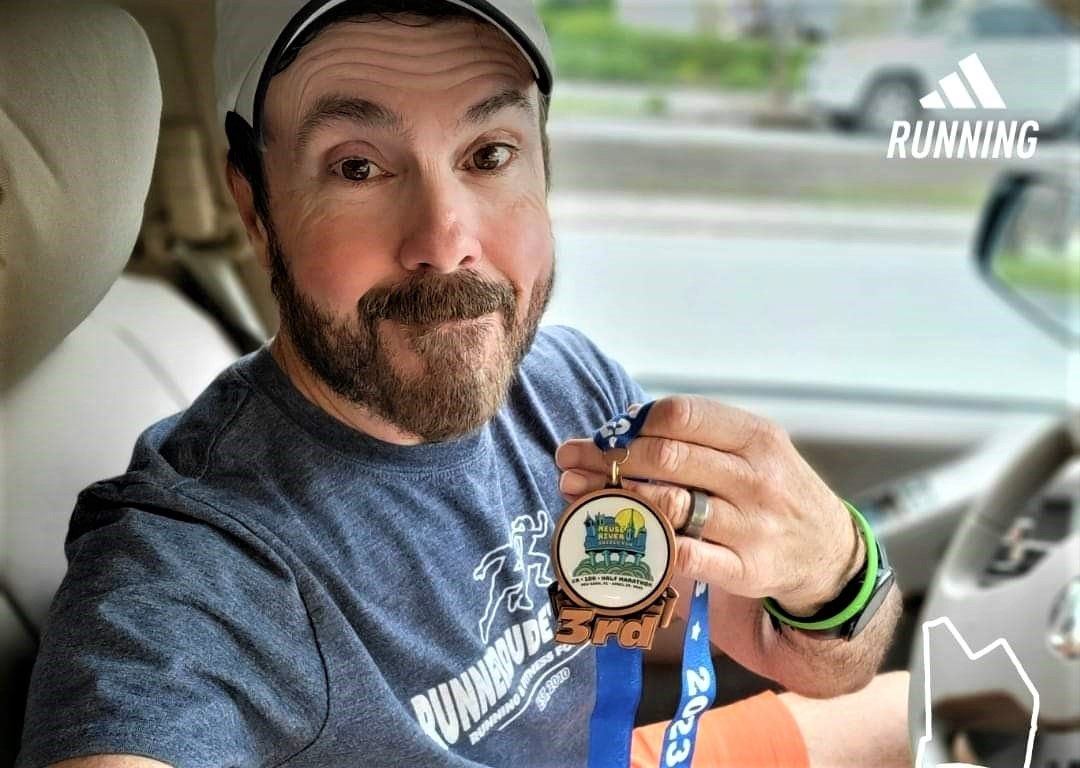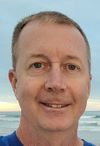Runners Q&A: Thad McLaurin
The RunnerDude's Fitness owner talks about his diagnosis of lung cancer and how he is responding.

He is fit. No history of it in his family. No reason to believe this could happen.
"Four words I thought would never come out of my mouth," he wrote in an email to his RunnerDude's Fitness clients in February. "I have lung cancer."
The Greensboro resident, 58, received the diagnosis in February. He also has received uplifting support from his family and the running community – and an uplifting form of treatment.
McLaurin will host his annual running series, Run the Boro, starting Saturday. He sat down this week to discuss that, his diagnosis and his comeback.
RS: The words "how are you?" are a great way to greet people. In your case, I want to ask, how are you?
McLaurin: "I'm a whole lot better than I was about a month ago. So night and day compared to February, beginning of March."
RS: Tell me what happened as far back as late 2022 and how you knew you were encountering something that needed to be dealt with.
McLaurin: "Before Christmas, I had what I thought was an upper respiratory problem going on, which isn't uncommon for me to have. It was just congestion and stuff. I started to have a little bit of a cough. Christmas came and went, and in January, it started to get a little bit worse. The cough was getting worse. I contacted my physician, and you know how hard it is today to get an in-person visit (laughs).
"It was going to be a while before my regular physician could see me, so they suggested I go to the walk-in clinic, which I thought I'd be walking in, but, no, it was a virtual appointment at the walk-in clinic. They thought I had a sinus infection, which I have those periodically. So that didn't seem a strange diagnosis. They treated me for that, but I didn't get better.
"Maybe three weeks after that, I woke up with a fever, a really bad cough; it was worse. Still a lot of congestion. So I called back and insisted on seeing somebody in person. Still went to the walk-in clinic, but it was in person, and the physician there checked my breathing. He thought from that I might have pneumonia. So they did an X-ray.
"But he said there's a lot of other stuff in there that's not supposed to be in there (laughs). So I'm like, 'What do you mean?' (laughs) He immediately set up an appointment to see a pulmonologist. I went there, shared my story with her, and she did a CAT scan. She thought I did have some type of cancer. She wasn't sure what it was, but the way it was presenting to her it looked like some type of cancer. They sent me to have a biopsy done.
"And from that, they determined I definitely did have cancer. Lung cancer."
What: Series of field trips in Greensboro for runners, highlighting the city's neighborhoods, greenways, university campuses, architecture, art and history.
When: Saturdays in May and June.
Start time: 7 a.m. each Saturday. Arrive by 6:45 a.m.
Location: First run will begin from Cone Health MedCenter for Women, 930 Third St., Greensboro.
What he's saying: "It really is for everybody. There are, I think, 12 pace groups, and they're not pace groups in the sense of a race. There's a pace guide leader at a given pace range who's going to guide you through the route. So there's a little bit of mystery. The participants don't know exactly where they're going to go; the pace guide later does. So there's walking groups all the way up to speedy 7½- or eight-minute pace groups. So there really is something for everybody.
Learn more: Run the Boro site.
RS: That is such a tremendous diagnosis to get. I can't imagine what that was like. For you, what was that experience?
McLaurin: "I was at home after the biopsy, and I got a phone call from the pulmonologist. She first asked me, 'Are you home alone?’ (laughs) ‘OK, this isn't good.' That's when she gave me the diagnosis, which is adenocarcinoma, a type of lung cancer.
"It was fairly aggressive from what she could see for the time range that I was having symptoms.
"I was in shock and just kind of numb.
"But immediately she set up an appointment with an oncologist at Wesley Long Cancer Center. Everybody, from the pulmonologist to the oncologist team, they have been awesome, have been great. You can't present that news in a good way, but they did the best they could and have been very supportive through the whole process."
RS: What was the initial reaction of the people closest to you, your family and your closest friends?
McLaurin: "It's shock. I've always been a fairly healthy person. I've been running for over 35 years. I've never had any issues with my lungs. I've never had pneumonia. I've had just the typical respiratory infections, things like that. I don't have lung cancer history in my family.
"It was a big shock. It was a shock for my wife, my kids; telling them was really hard. But they've been very, very supportive. ...
"It was harder on my wife (Mitzi) than I realized. She's a teacher; she took off about a month to be home with me, which was good because she wanted to be in on all of the scans and doctor visits. But she also went through a phase of it was hard for her to eat and sleep.
"She's been great. She's been very supportive. I have three kids, and they've all been very supportive. And then just the network of clients and runners that I work with and just people that I know in the community have been amazing with their support. People have reached out: cards, letters, emails, phone calls, instant message and sending prayers and thoughts. That's helped just as much as the medicine has."
RS: You were given a very difficult diagnosis, but there's some bit of a silver lining in it regarding treatment.
McLaurin: "Most people think that if you have lung cancer, it's because you've smoked or you've been exposed to something like that. So (the oncologist) was telling me that people that do not smoke who have this particular kind of cancer have a higher chance of the cancer itself, not me, but the cancer itself having a genetic mutation. And if you have that genetic mutation, then there's a chance of having 10 to 12 different biomarkers. And these biomarkers are what allow the cancer to spread and grow and be invasive in other areas of your body.
"So if you have this genetic mutation, you have one of these biomarkers, there's a medication called targeted treatment. And this medication blocks the biomarkers so the cancer can't spread and it shrinks it.
"From what I understand, I'll be on this medication from now on. In some form, I'll probably still always have some level of cancer, but it keeps it so minimal, hopefully, that I'll have many more years and a good quality of life."
RS: "You've inspired so many runners, so many athletes, and so many people in our community. Where have you found inspiration during these last several weeks, and what has inspired you as you've gone through this?
McLaurin: "My family, of course; they've been very helpful. My daughter who lives in Durham has come over many times to help out and do stuff and just to be there. My son's helped out a ton. My younger daughter who's still at home; she's still in college. They've all pitched in in their different ways. Just having that strong family network has helped a great deal.
"Just the outreach from the rest of the mainly running community but other people on Facebook has been tremendous. It really has helped as much as I think the medicine has.
"I did take off a couple of weeks while the medicine kicked in. There are some side effects; some can be severe. Luckily, I haven't had any really major; they're all minor things I can definitely deal with. I took off a little bit but trying to keep a schedule. Still working with my runners and stuff has helped out a lot. I'm starting to add a little bit back each week."
RS: You've organized events. You've raced in events. You've participated in so many events. But you took part in one Saturday in New Bern, and why is this one going to stand out for you?
McLaurin: "It was the Neuse River Bridge Run. I had signed up for it probably around Thanksgiving, before any of this stuff kicked in. My parents, they're both passed now, but they retired in New Bern. So the past 25 or 30 years or so, we've gone to New Bern to see my parents. My kids think of that as that's where the grandparents live. So there's a connection there. And I hadn't been back in a while since my mom passed. I wanted to go back and just be in that area again.
"I was originally planning to do the half marathon and was going to start training for that, and then all of this stuff happened. I just thought I wasn't going to run it. I did have about 10 runners that were training with me for it. I decided if I was feeling better, I wanted to go down at least and cheer them on and be there for support.
"But because the medicine was kicking in and I was starting to feel so much better, I contacted the race director to see if I could switch from the half to the 5K. About two weeks, three weeks, prior to the race, I started with two miles and then added a half-mile each time I went out and ran. So I got up to 4½ miles before the race, and I was just going to run it, not really knowing what to expect. I knew I could do the distance because I'd already done the 4½.
"But it was a pretty day. I felt good. So I pushed it. It wasn't anything like pre-all-of-this (laughs), but I did end up getting third in my age group, which was a nice surprise. And it felt good.
"It felt good to be doing what I love with other people that do what I love. It was nice to see my other runners running strong.
"It was just a reassuring that I'm heading in the right direction. It felt really good."
RS: Do you have a takeaway or a message for the community? You're still going through this, but to this point.
McLaurin: "The RunnerDude mantra is trust, believe, conquer. That applies great for running and physical fitness goals, but it applies definitely to life. I've trusted in my doctors, believe in them that they're doing the right treatment plan for me, and so far I'm conquering it. So I think that's a good mantra for people to have if they don't have one (laughs), RunnerDude or not."
